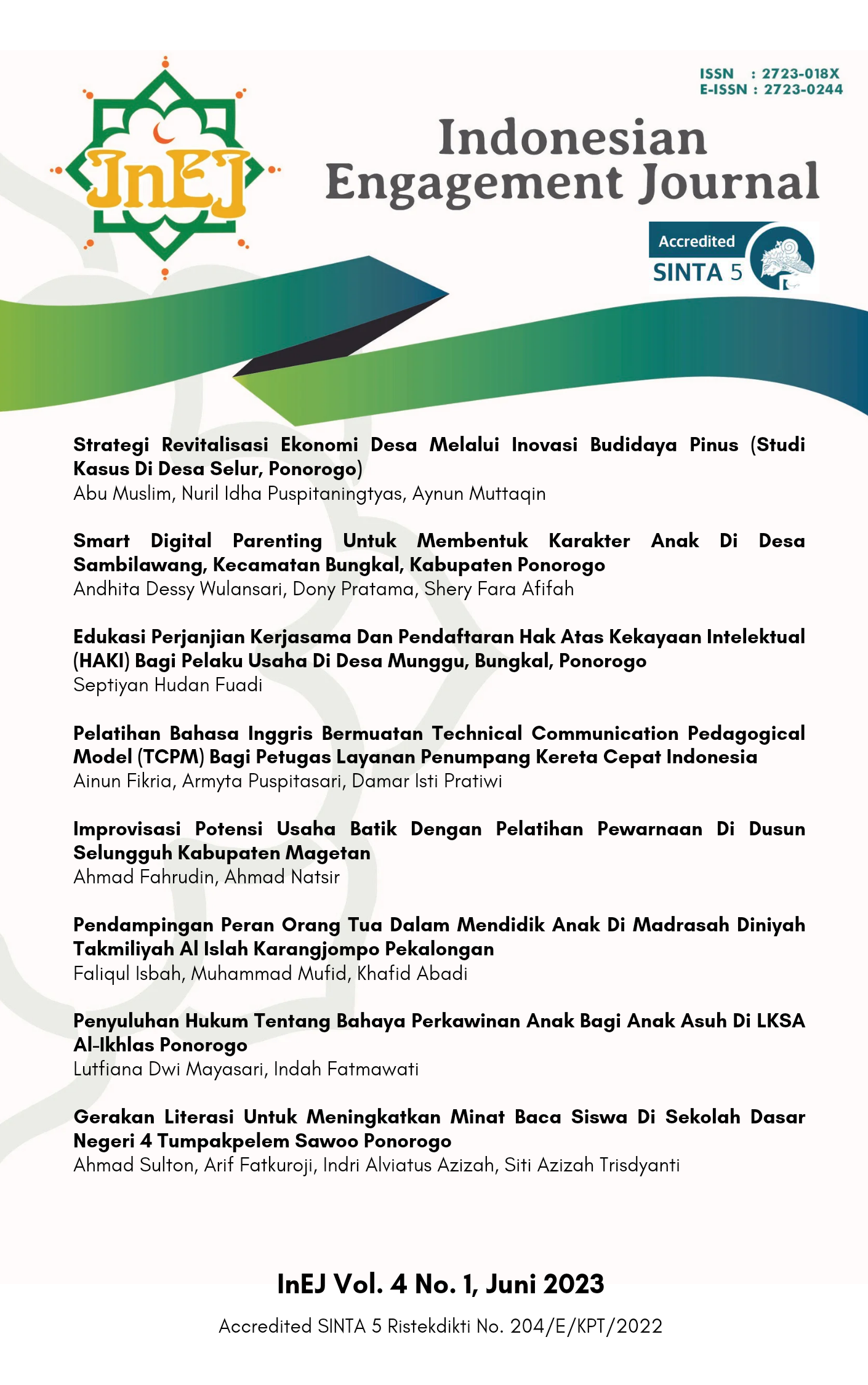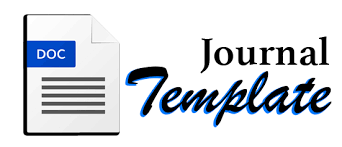PENDAMPINGAN PERAN ORANG TUA DALAM MENDIDIK ANAK DI MADRASAH DINIYAH TAKMILIYAH AL ISLAH KARANGJOMPO PEKALONGAN
DOI:
https://doi.org/10.21154/inej.v4i1.5941Keywords:
Parent, Child, Madrasah Diniyah TakmiliyahAbstract
Peran Pendidikan Diniyah (keagamaan) untuk membangun karakater anak sejak dini sangan fundamental, karena pada fase pendidikan inilah anak-anak kita bentuk agar memiliki perilaku sikap yang baik. Semestinya tanggung jawab untuk mendidik anak bukan hanya menjadi tanggung jawab guru di Madrasah atau majelis taklim. Namun juga menjadi tanggung jawab para orang tua untuk memastikan mereka memiliki kesamaan visi dalam mencetak anak yang berbudi luhur. Sedangkan pada kenyataannya banyak orang tua yang merasa telah selesai memberikan pendidikan kepada anak ketika mereka mendaftarkan anak-anaknya ke Madrasah Dinyah. Inilah yang menjadi dasar pentingnya program pengabdian ini untuk dilaksanakan di MDT Al Islah Karangjompo Pekalongan. Metode program pengabdian ini berupa Service Learning, dimana tim pengabdi dari kalangan akademisi memberikan stimulus kepada sasaran program agar dapat melaksanakan dan mengembangkan program yang sesuai, dimulai dari tahapan pra implementasi, implementasi dan pasca implementasi.Hasil program pengabdian ini adalah terfomulasikannya kerangka kurikuler gagasan Al Ghazali dalam kitab Ayyuha al Walad dan model pendidikan Islam K.H. Abdurrahman Wahid dalam bidang penguatan akhlak yang siap pakai, modul silabi pendidikan kitab Ayyuha al Walad yang dapat digunakan dan dikembangkan oleh Guru pada pelajaran lainnya, serta disepakatinya program pengajian wali santri MDT Al Islah setiap bulan untuk memberikan penguatan dan kesadaran mereka tentang tanggung jawab para orang tua dalam mendidik anak.
References
Basyar, Khoirul. 2022. Wawancara Guru MDT Al Islah 23 Oktober 2022. Pekalongan.
Ghazali, Al. n.d. Ayyuha Al Walad. Jakarta: Dar El Kutb.
Isbah, F., & Priyanto, A. ( ). 2021. “Peran Istighosah Guna Menumbuhkan Nilai-Nilai Spritualitas Diri Dalam Menghadapi Problematika Kehidupan.” Spiritual Healing : Jurnal Tasawuf Dan Psikoterapi 1(2):82”“90. doi: https://doi.org/10.19109/sh.v1i2.8086.
Kasanah, Siti. 2021. “Relevansi Pemikiran Pendidikan Abdurrahman Wahid Dan Abdurrahman An-Nahlawi Di Era Modern.” Tribakti: Jurnal Pemikiran Keislaman 32(1):169”“80. doi: 10.33367/tribakti.v32i1.1096.
Mu’minatussolichat. 2022. Wawancara Wali Santri MDT Al Islah 22 Oktober 2022. Pekalongan.
Novi Cahyaningsih dan Faliqul Isbah. 2021. “Pendampingan Optimalisasi Peran Masyarakat Untuk Desa Progresif Dengan Asas Kemaslahatan Di Era Reformasi Industri 4.0 (Studi Lapangan Di Desa Jambearum, Kec. Patebon Kab. Kendal Jawa Tengah).” Jurnal Pengabdian Kepada Masyarakat Radisi 1(3):166”“75.
Rohman, M. Taufiku. 2022. Wawancara Sekretaris Desa Karangjompo 15 Juni 2022.
Sumari. 2022. Wawancara Kepala Desa Karangjompo 15 Juni 2022.
Suprayitno, Adi, and Wahid Wahyudi. 2020. Pendidikan Karakter Di Era Milenial. 1st ed. Yogyakarta: Deepublish.
St. Syamsudduha, St. Syamsudduha, and Nurjannah Yunus Tekeng. 2017. “Penerapan Service Learning Dalam Pembelajaran Matakuliah Pedagogik Pada Kurikulum Pendidikan Calon Guru.” Lentera Pendidikan : Jurnal Ilmu Tarbiyah Dan Keguruan 20(1):1”“17. doi: 10.24252/lp.2017v20n1a1.
Ula, Miftahul, and Faliqul Isbah. 2022. “Dimensi Tasawuf Dalam Ilmu Nahwu.” JOUSIP: Journal of Sufism and Psychotherapy 2(1):89”“106. doi: https://doi.org/10.28918/jousip.v2i1.6001.
Umam, Azka Najmul. 2022. Wawancara Guru MDT Al Islah 22 Oktober 2022. Pekalongan.
Wahid, Abdurrahman. 2001. Menggerakkan Tradisi : Esai-Esai Pesantren. 1st ed. edited by H. S. H.S. Yogyakarta: LkiS.
Yu’timaalahuyatazaka. 2016. “Model Pengembangan Kurikulum Hilda Taba Dan Identifikasinya Dalam Kurikulum Pendidikan Islam.” Jurnal Manajemen Pendidikan Islam 4(2):138”“48.
Zulaikha. 2022. Wawancara Wali Santri MDT Al Islah 22 Oktober 2022. Pekalongan.
Zulhanif. 2018. “Penyusunan Silabus Dan Rencana Pelaksanaan Pembelajaran (RPP) Untuk Meningkatkan Kompetensi Guru Melalui Supervisi Akademik Di SDN 165 Pekanbaru.” Jurnal Pigur 01(02):42”“52.
Downloads
Published
Issue
Section
License
Please find the rights and licenses in InEJ. By submitting the article/manuscript of the article, the author(s) agree with this policy. No specific document sign-off is required.1. License
The non-commercial use of the article will be governed by the Creative Commons Attribution license as currently displayed on Creative Commons Attribution-NonCommercial-ShareAlike 4.0 International License.
2. Author(s)' Warranties
The author warrants that the article is original, written by stated author(s), has not been published before, contains no unlawful statements, does not infringe the rights of others, is subject to copyright that is vested exclusively in the author and free of any third party rights, and that any necessary written permissions to quote from other sources have been obtained by the author(s).
3. User/Public Rights
The spirit of InEJ is to disseminate articles published are as free as possible. Under the Creative Commons license, InEJ permits users to copy, distribute, display, and perform the work for non-commercial purposes only. Users will also need to attribute authors and InEJ on distributing works in the journal and other media of publications. Unless otherwise stated, the authors are public entities as soon as their articles got published.
4. Rights of Authors
Authors retain all their rights to the published works, such as (but not limited to) the following rights;
Copyright and other proprietary rights relating to the article, such as patent rights,
The right to use the substance of the article in own future works, including lectures and books,
The right to reproduce the article for own purposes,
The right to self-archive the article,
The right to enter into separate, additional contractual arrangements for the non-exclusive distribution of the article's published version (e.g., post it to an institutional repository or publish it in a book), with an acknowledgment of its initial publication in this journal (InEJ: Indonesian Engagement Journal).
5. Co-Authorship
If the article was jointly prepared by more than one author, any authors submitting the manuscript warrants that he/she has been authorized by all co-authors to be agreed on this copyright and license notice (agreement) on their behalf, and agrees to inform his/her co-authors of the terms of this policy. InEJ will not be held liable for anything that may arise due to the author(s) internal dispute. InEJ will only communicate with the corresponding author.
6. Royalties
Being an open accessed journal and disseminating articles for free under the Creative Commons license term mentioned, author(s) aware that InEJ entitles the author(s) to no royalties or other fees.
7. Miscellaneous
InEJ will publish the article (or have it published) in the journal if the article’s editorial process is successfully completed. The editors of Journal may modify the article to a style of punctuation, spelling, capitalization, referencing and usage that deems appropriate. The author acknowledges that the article may be published so that it will be publicly accessible and such access will be free of charge for the readers as mentioned in point 3.




